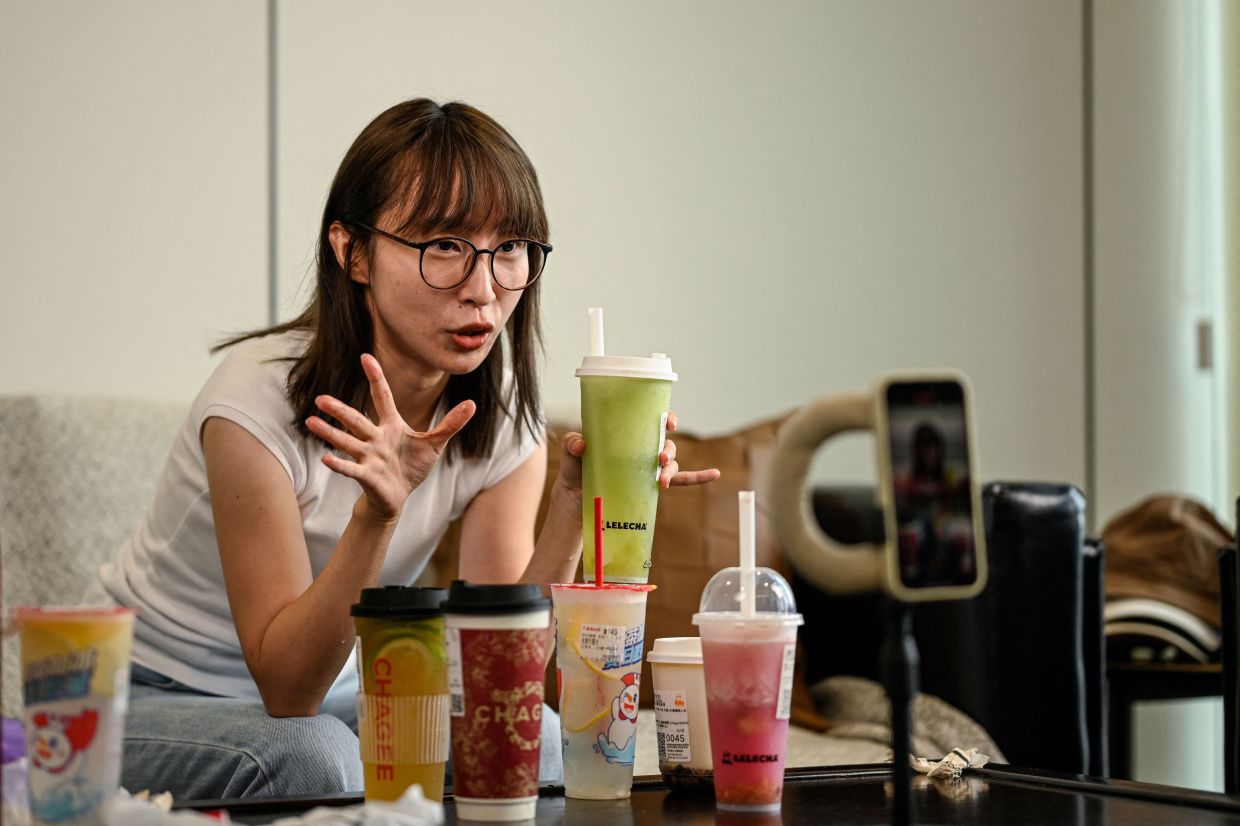This photo taken on August 29, 2024 shows people drinking at bubble tea chain Mixue Bingcheng's shop at an office building in Beijing. Sweet, milky and colourful -- bubble tea is wildly popular in China, where people sipping through straws from large plastic cups is a common sight in high streets and shopping malls across the country. — Photo: JADE GAO/AFP
Sweet, milky and colourful – bubble tea is wildly popular in China, where people sipping through straws from large plastic cups is a common sight in high streets and shopping malls across the country.
But there's fresh competition brewing in the vast market, characterised by ultra-cheap products that are striking a chord with China's increasingly frugal young consumers.
Bubble tea – which classically includes tapioca balls and comes in a wide range of flavours, with or without milk – has gained huge popularity in China, coinciding with an economic boom in recent decades that propelled living standards upwards.
Post-pandemic headwinds, however, have hit the economy hard, with consumers reluctant to dip into their pockets and Chinese authorities struggling to get people spending.
Many of today's biggest bubble tea chains once built followings with premium products priced around 25 to 40 yuan (RM15.29 to RM24.46) and flashy branding that made them status symbols of contemporary urban life in China.
But the sector – which last year was estimated to be worth more than US$21bil (RM91bil) – has been jolted by a new wave of low-cost disruptors, some offering drinks for $1 (RM4.35) or less.
"The existing market is saturated," Stacy Chen, a bubble tea vlogger based in the eastern city of Hangzhou, told AFP.
"Reducing prices is the only feasible way (for companies) to highlight their market competitiveness."
Chen has forged an online following of bubble tea enthusiasts who watch her videos on lifestyle app Xiaohongshu and Douyin, the Chinese version of TikTok, where she has about 180,000 followers.
In her videos, she sits in front of a row of beverages, testing them and comparing them before offering her viewers a frank assessment of their appearance, taste and cost.
Chen showed AFP the breadth of options available to consumers on a commercial street outside her office, where uniformed deliverymen on wheeled hoverboards whisked away orders from over a dozen tea shops, all within a short walk of one another.
"There are so many milk tea brands on the market now, and they release new products very quickly," Chen told AFP.
"We milk tea and coffee vloggers can't shoot all the content."
Spoilt for choice
China's bubble tea industry has flourished in recent years, with countless brands now accounting for an estimated half million shops across the country.
Chief among the budget upstarts is Mixue Bingcheng, founded by a pair of brothers in 1997 as a humble shaved ice shop in the hinterland province of Henan.
The company – whose name translates as "honey snow ice city" – has expanded rapidly, with its smiling snowman mascot and bright red signs adorning about 32,000 stores in China and around 4,000 more in 11 other nations as of last year.
"Current consumer sentiment (in China) is seeing many restaurants and cafes lower their prices to match spending behaviour," Evelyne Chang, market analyst at China Skinny, told AFP.
Mixue "has the first-mover advantage in the low-price milk tea segment", said Chang, adding that "stiff competition and product homogeneity" have led to a price war in the sector.
A highly anticipated post-Covid economic recovery in China has not yet materialised, with property sector woes and heightened trade tensions weighing on consumer confidence.
Retail sales growth has remained sluggish and unemployment rates have stayed stubbornly high, fuelling concerns about a prolonged economic downturn.
Bang for buck
For many young professionals looking to pinch pennies while working in China's top-tier cities, new companies such as Mixue have become more attractive.
"Other milk teas are too expensive," 21-year-old Guo Jun told AFP outside a Mixue shop in Beijing.
Guo, who hails from the northern province of Hebei but now lives and works in the capital city, said she had just purchased an iced lemonade using a discount on Douyin for a total of 2.8 yuan (RM1.71).
"Work stress is high, the current economic environment is not good, things like salary are not great, so (young people) may choose to be more practical," said Guo.
Chen, the vlogger in Hangzhou, says that the low-cost bubble tea trend was due at least in part to the soaring popularity of domestic coffee chains offering bargain alternatives to more premium-oriented foreign firms like Starbucks.
This, according to Chen, affected Chinese consumers on a psychological level, causing them to expect more bang for their buck.
"Before, we all fundamentally saw coffee as an imported or luxury product," she said.
"Now I can buy a luxury product for 9.9 yuan (RM6.05) or 8.8 yuan (RM5.38).
"Why should I spend more than 20 yuan to buy a cup of milk tea?" – AFP




